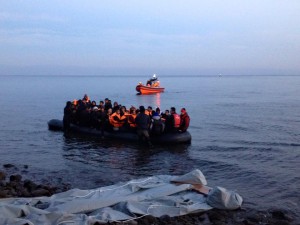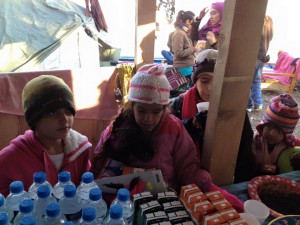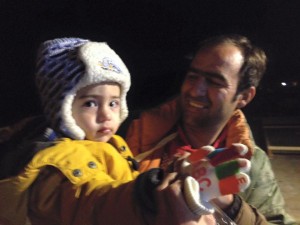
Europe’s refugee crisis may no longer be headline news in the UK, but it still dominates life on the Greek island of Lesvos. With the numbers of new arrivals per day down from averages of five or six thousand in the summer, the island still sees roughly one thousand or so people coming in on these calmer winter days. Ever since the signing of a new border control agreement between the EU and Turkey, however, routes have been disrupted. While all the boats once went straight to the northern coast of the island, which is closest to Turkey, a stretch of sea that can normally be crossed in only an hour or so, patrols by the Turkish coast guard have forced refugees to take alternative routes, with many now arriving on the southern beaches.
 If boats are caught by the Turkish coastguard or by FRONTEX (European border force) patrols in Turkish waters, they are ‘pushed back’ to the Turkish coast. The Turkish coastguard then indiscriminately arrests everybody on board and they are locked in prison for three days, before being released to inevitably attempt the journey again. We can sometimes see the boats be apprehended and dragged back from the shore here on Lesvos. If the boats make it to Greek waters, the Turkish coast guard will back off, and once they are on shore we often hear stories from the people on board of how the Turkish boats pull up close to their small dingy, attempting to splash water into the boat, and reaching over to attack the refugees with batons. Tragically, this is the kind of ‘border control’ operation that European taxpayers are funding the Turks to carry out on our behalf.
If boats are caught by the Turkish coastguard or by FRONTEX (European border force) patrols in Turkish waters, they are ‘pushed back’ to the Turkish coast. The Turkish coastguard then indiscriminately arrests everybody on board and they are locked in prison for three days, before being released to inevitably attempt the journey again. We can sometimes see the boats be apprehended and dragged back from the shore here on Lesvos. If the boats make it to Greek waters, the Turkish coast guard will back off, and once they are on shore we often hear stories from the people on board of how the Turkish boats pull up close to their small dingy, attempting to splash water into the boat, and reaching over to attack the refugees with batons. Tragically, this is the kind of ‘border control’ operation that European taxpayers are funding the Turks to carry out on our behalf.
Over the last month, I’ve been one of the volunteers that make up the international teams welcoming migrants when they arrive. We are people from all over the world, rescue boat drivers, lifeguards, doctors, and just people, like me, who are ready and willing to help out. At our solidarity camps we give freezing cold, wet and scared people a change to change into some dry clothes, hot tea and food, and all the information, and warmest welcome that we can, before they carry on their journey.
 Following their arrival the Syrians, Afghans and Iraqis that make a large proportion of the refugees are ferried to the registration “hot spots” on the island. The process is depressingly slow. Ever since FRONTEX took over from the Greek authorities it has been slower still. Sometimes refugees will get through and reach Mytiline, the capital of the island, where they can take a ferry to Athens in order to continue their journey. But sometimes they are forced to camp out at the registration point and queue up for days. It is cold and families are sleeping in tents on the concrete. In some cases they don’t even have tents. For those who are not Syrian, Afghan or Iraqi arrival in Europe resembles even less of a sanctuary from the crises they are fleeing. They cannot register and therefore cannot legally continue their journey. Any African refugee for example is stuck. As there is no official solution for them, they are simply left to find another smuggler or another way to escape the island where there is nothing for them and no legal route in sight. The smugglers do not do return journeys to Turkey.
Following their arrival the Syrians, Afghans and Iraqis that make a large proportion of the refugees are ferried to the registration “hot spots” on the island. The process is depressingly slow. Ever since FRONTEX took over from the Greek authorities it has been slower still. Sometimes refugees will get through and reach Mytiline, the capital of the island, where they can take a ferry to Athens in order to continue their journey. But sometimes they are forced to camp out at the registration point and queue up for days. It is cold and families are sleeping in tents on the concrete. In some cases they don’t even have tents. For those who are not Syrian, Afghan or Iraqi arrival in Europe resembles even less of a sanctuary from the crises they are fleeing. They cannot register and therefore cannot legally continue their journey. Any African refugee for example is stuck. As there is no official solution for them, they are simply left to find another smuggler or another way to escape the island where there is nothing for them and no legal route in sight. The smugglers do not do return journeys to Turkey.
There is a desperate need for better EU resources to support Greece in effectively processing and finding solutions for the people who continue to arrive. No one who makes this journey has anything back home to return to or much left to lose. It is not an answer to isolate ourselves from the European relief effort, as the UK has effectively done, and refuse to help. But it is also clear that the EU continues, at least in large part, to treat the crisis as an issue of border security, devoting resources into stopping people from arriving, rather than a humanitarian crisis, requiring European states to provide assistance and sanctuary to those arriving. There are many children suffering in this country who are at real risk of human trafficking and other abuses. The UK must act in solidarity with the rest of the EU countries to resettle and manage this influx of people adequately. Numbers that are presently completely overwhelming Greece could be absorbed without much effort into the EU as a whole.
Zoe Gardner is a migrant rights campaigner and spokesperson for Another Europe Is Possible. You can follow her on Twitter: @ZoeJardiniere.
Photos: © Zoe Gardner
4th January 2016
